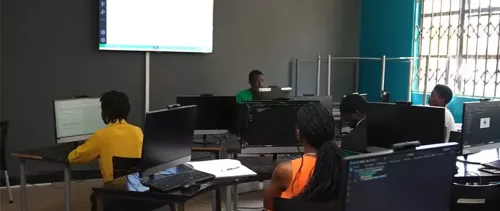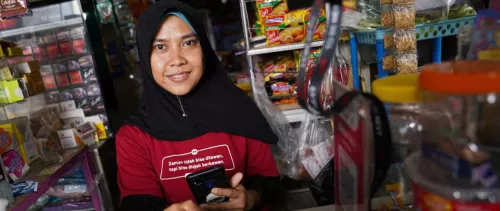
- IDB and World Bank are coordinating activities to connect 3.5 million students and train more than 265,000 teachers in digital skills.
- They are projecting additional investments of $400 million for the next two years to support this agenda.
- Both institutions will co-create public goods such as platforms to map and expand connected schools and assess teachers’ digital skills, along with multiple knowledge products.
The Inter-American Development Bank and the World Bank announced a set of coordinated actions to accelerate learning by enhancing the digital transformation of education systems in Latin America and the Caribbean.
As part of a shared vision of promoting sustainable and inclusive growth, the two institutions will coordinate activities on the $512 million that they are currently investing to boost the region's digital transformation of education systems.
These joint efforts will focus on improving access to connectivity, devices, educational platforms, and digital skills development for students and teachers. As a result, over 3.5 million students, more than 350,000 teachers, and 12,000 schools will be beneficiaries in 16 countries. Furthermore, an additional investment of $400 million is planned to promote this agenda in the next two years.
Last August, IDB President Ilan Goldfajn and World Bank President Ajay Banga signed a Memorandum of Understanding, a groundbreaking partnership to drive stronger results for people in three main areas: boosting support for net-zero-deforestation efforts in the Amazon, strengthen the Caribbean’s resilience to natural disasters, and bridging the digital-access gap, across the region. Since then, the technical teams have developed a plan and identified concrete actions to deliver on those commitments.
IDB Vice-president for Sectors and Knowledge Ana María Ibáñez, and World Bank Director of Human Development for Latin America and the Caribbean, Jaime Saavedra, explained during a fireside chat at IDB Headquarters in Washington, DC, that this collaboration will go beyond operations and include the co-creation of new knowledge and public goods.
The two institutions will develop guidelines and platforms to speed up the process of connecting schools and move towards universalization, equipment and devices purchasing, and teachers' training to improve learning.
“This collaboration is greater than just the sum of its parts. By bringing together our strengths and resources, we are committed to improving learning and unlocking new opportunities for human capital development. We believe that quality education, accessible to all throughout life, is essential in overcoming poverty and inequality. There's no sustainable growth without skills accumulation, and improved learning opportunities require harnessing new technologies for education”, said IDB Vice-president Ana María Ibáñez.
“At the World Bank, we are committed to closing the digital divide in LAC. Working jointly, we can move faster. Just this initiative will allow us to provide better opportunities for more than three and a half million students and 350,000 teachers. The essential factor to improve learning is effective teachers, and digital technologies can leverage dramatically the work of the teacher in the classroom and help us reach all children effectively”, emphasized World Bank director of Human Development for LAC, Jaime Saavedra.
About the IDB
The Inter-American Development Bank is devoted to improving lives. Established in 1959, the IDB is a leading source of long-term financing for economic, social, and institutional development in Latin America and the Caribbean. The IDB also conducts cutting-edge research and provides policy advice, technical assistance, and training to public- and private-sector clients throughout the region.
About the World Bank
The World Bank Group plays a key role in the global effort to end extreme poverty and boost shared prosperity. It consists of five institutions: the World Bank, including the International Bank for Reconstruction and Development (IBRD) and the International Development Association (IDA); the International Finance Corporation (IFC); the Multilateral Investment Guarantee Agency (MIGA); and the International Centre for Settlement of Investment Disputes (ICSID). Working together in more than 100 countries, these institutions provide financing, advice, and other solutions that enable countries to address the most urgent challenges of development.


